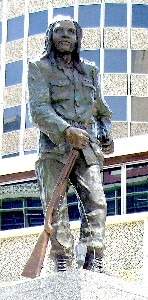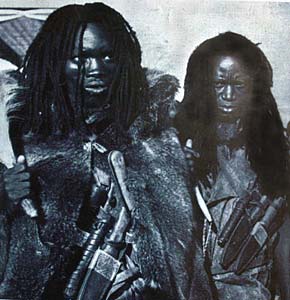
Dedan Kimathi statue in Narobi

Dedan Kimathi, Mau Mau Leader
As recruits poured into the woods, Kimathi assigned them to gangs and appointed leaders. Frequently, he re-grouped his forces into military companies and regiments and gave his leaders military titles among the lines of British army regulations.
During the first few months, the Mau Maus in the woods had an easy life. Each day, trucks loaded with food, guns, and ammunition rolled out of Nairobi for secret destinations along the edges of the Aberdare Forest. Nightly forays were made, and herds of stolen cattle were brought back for food.
Then Royal Air Force planes were called in. They swooped low over the trees and peppered the area with bombs. Hundreds of May Mau fell under the rain of explosions, but the bombing did not limit deaths to tribesmen. The bursts had also wounded and killed thousands of animals, from antelopes to elephants. The bombings had to be called off, but--partly because of the bombings and partly because it was convenient to Kimathi’s plans--raids against white settlers increased, and in February, 1953, the first mass mutilation-murders began.
One settler told me how he was awakened in the night by a scream. He leaped out of bed, grabbing his Weatherby rifle, and threw open the door. One of his plantation workers, a member of the Luo tribe, was running toward the house. He never made it. As a knife thunked into his back, he pitched headlong into the doorstep. The settler stood entranced by the sight of his worker laying at his feet, the blood gushing around the edges of the blade. A volley of bullets splintering into the door awakened his senses, and he dropped to the floor and put his rifle into action. He saw only dark shadows moving in the fields, but he poured round after round in their direction. From the natives’ quarters, he heard more cries of anguish as the Mau Mau made mincemeat of his helpers. His wife and his young son were crawling on the floor behind him, choked in fear.
Then a thumping of feet along the side of the house told him that a Mau Mau was attacking on his left. He scrambled to his knees and backed into the house, shutting the door just as a dark hand brought a blade into view. He fired a quick succession of shots into the closed door and heard a groan and thump as the warrior crumpled on the step.
His wife had hugged him around the waist, and his son was crying when he ordered them under the bed. Windows were shattering from bullets, and walls were absorbing shots with small explosions of wood.
Then, as suddenly as the fighting had begun, it stopped. Silence. Then a few moans from outside. He crawled up to the door and opened it a crack, peering out into the darkness. The shapes were moving away.
Others were not quite so lucky. There were plantations completely destroyed by the terrorists, men and children shot and dismembered, women raped and mutilated, stock killed, buildings burned.
The British government began an all-out campaign against the Mau Mau to be directed particularly against Kimathi, the mass executioner who was, at this time, considered by his followers an invincible god. The C.I.D., in 1953, devised a plan to break the power of the Mau Mau. Troops were sent into the area, but achieved little success. Meanwhile, raids continued, and the death toll mounted.
Kimathi had become imbued with an insatiable lust to kill. For every settler murdered during this period, a hundred of his own men were wantonly slaughtered if they disagreed with him or failed to back his movement. Young Kikuyu girls were captured in their villages and brought back for his pleasure. At one time, he had a harem of over 100 women, but during the four years he remained in hiding, he strangled all except one: Wanjiru, a 20-year-old, sloe-eyed, dusky beauty who adapted herself easily to a jungle existence.
It was at this point that “Operation Anvil” was put into effect by the British Constabulary. Late one night in August, 1954, an army of police surrounded Nairobi, and over 80,000 Kikuyus were arrested, taken out of the city, and detained in isolated areas for five years. This mass arrest had an immediate effect upon Kimathi and his followers. Now that he had lost contact with his sympathizers, supplies were cut off, and the Mau Mau were forced to depend on the jungle for sustenance. Their tattered clothes were discarded, and they began wearing skins of wild animals. Kimathi gave his top leaders forest names such a “General Lion,” “Colonel Cheetah,” “Captain Zebra,” and so on. Kimathi, himself, wore a garment of leopard skin and became known as “General Leopard.” With cordons of troops surrounding the area, food raids were halted, and because fires would reveal their location, they ate the raw flesh of beasts. Their hair grew long and matted and was plaited to facilitate the catching of lice and other vermin with which they became infested. To conserve ammunition, they depended on their pangas, long knives, as weapons of attack.
It was not long before the weak surrendered to the British. They were quickly taken to Nairobi, where they were rehabilitated and sent back into the forest as “pseudo gangs” for the purpose of killing or capturing Mau Mau.
The “pseudo gang” movement caught fire and brought consternation into the hearts of Kimathi’s followers. It quickly reached the point where those hiding in the woods never knew whether or not their companions were Mau Mau or paid agents of the British. Kimathi was infuriated that his once-faithful, oath-taking subjects had surrendered--and then had returned to hunt him down. He soon hated and suspected everyone.
Kimathi’s end was inevitable. On October 21, 1956, while raiding a nearby plantation for food, he was trapped by the Constabulary and severely wounded. He was quickly tried, found guilty, and hanged.
Kimathi was dead! And with him died the immediate threat of the Mau Mau. The thousands of prisoners were released and returned to their villages.
Strangely, while the Mau Mau lost the battle of the bamboo forest, the organization won the war for independence. During the past few months, Jomo Kenyatta received British assurances that Kenya would gain its freedom within the next year. http://www.janedolinger.org/page16.php

Dedan Kimathi statue in Narobi

Dedan Kimathi, Mau Mau Leader